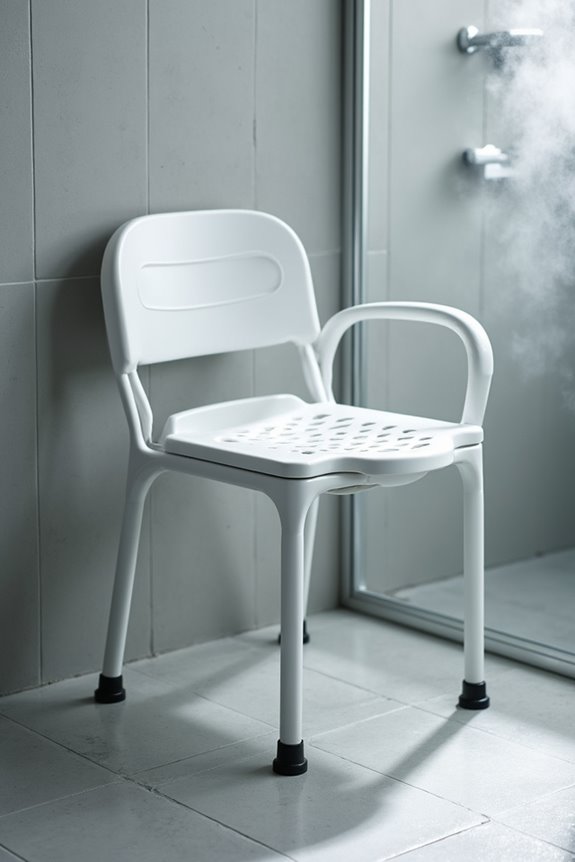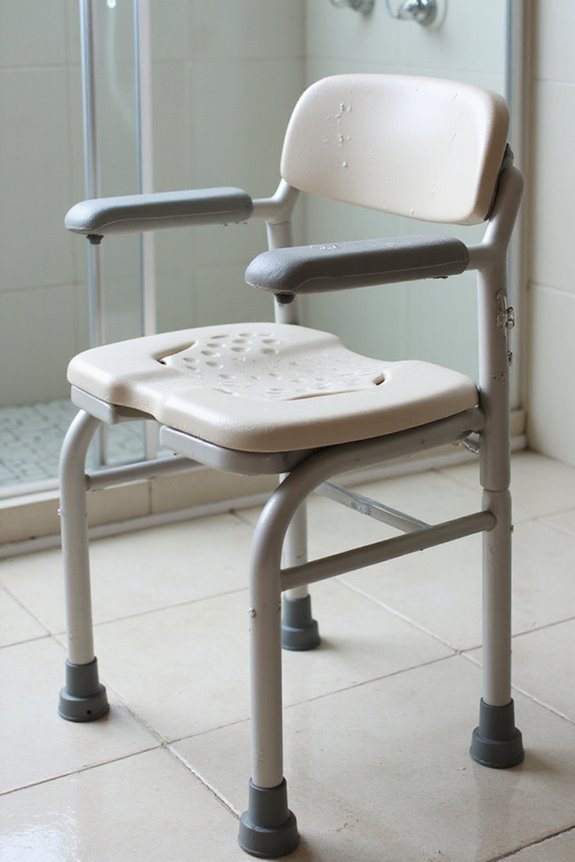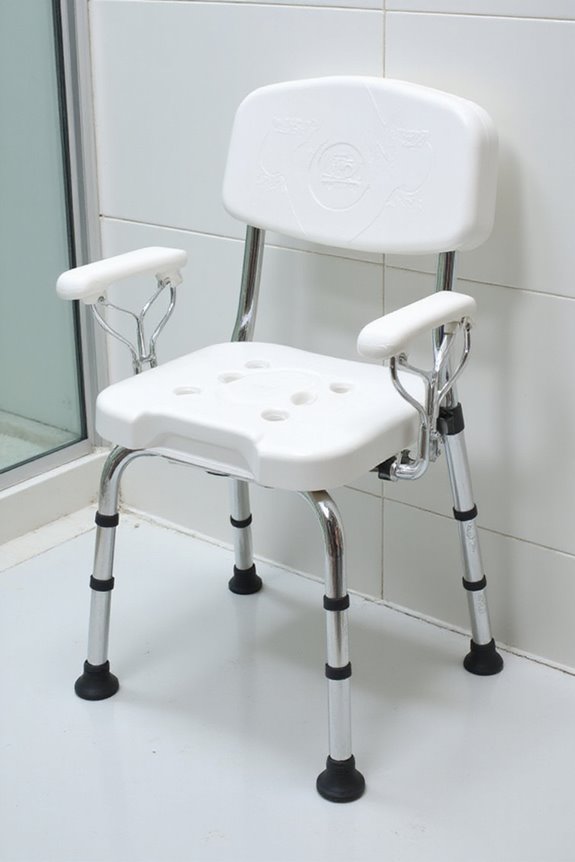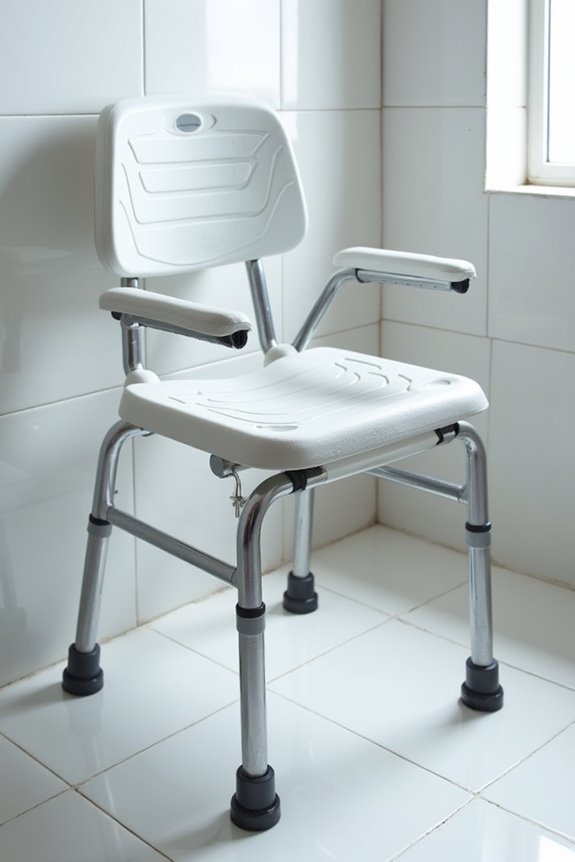The best shower chairs for the elderly prioritize safety and comfort. Key features include:
- Sturdy construction with non-slip rubber feet
- Adjustable seat heights
- Slip-resistant seat surfaces
- Padded seats for pressure relief
Recommended models such as the Carex Bath Seat and Drive Medical Shower Chair offer essential support and stability. Safety considerations are critical, including regular inspections and proper placement. For more in-depth insights on choosing the right shower chair, additional information follows.
Key Takeaways
- Look for shower chairs with sturdy construction and non-slip rubber feet to minimize the risk of accidents for elderly users.
- Choose models like the Carex Bath Seat or Drive Medical Shower Chair, known for their adjustability and comfort features.
- Opt for designs that include backrests and armrests to provide additional support and stability during use.
- Ensure the chair is lightweight for easy transport but made from durable materials like aluminum or stainless steel for long-term use.
- Regularly inspect the chair for wear and tear, and maintain it with mild soap to ensure safety and hygiene.
Key Features to Look for in Shower Chairs
Safety Features
- Sturdy construction minimizes the risk of collapse.
- Non-slip rubber feet prevent shifting on wet surfaces.
- Slip-resistant seat surfaces enhance stability.
Comfort and Ergonomics
- Padded seats reduce pressure on bones.
- Adjustable seat height accommodates various users.
- Lightweight materials facilitate movement.
Durability
- Moisture and mildew resistance guarantee long-term use.
- Rust-resistant components extend lifespan.
User Reviews
- Positive feedback often highlights the importance of design features such as adjustable legs and armrests.
- Many users appreciate the independence these chairs provide during bathing. Additionally, many models feature weight capacity requirements to ensure they can support users effectively.
Top Recommended Shower Chair Models

Selecting the right shower chair is essential for ensuring safety and comfort for elderly users. The following models stand out based on user testimonials and shower chair innovations:
- Carex Bath Seat: Adjustable height, tool-free disassembly, ideal for curved tubs.
- Drive Medical Shower Chair with Back: Lightweight, durable, and adjustable for comfort.
- NOVA Deluxe Bath Seat with Back & Arms: Offers enhanced stability and support.
- Ez2care Adjustable Lightweight Shower Bench: Rust-resistant aluminum legs and adjustable seat height.
- ProBasics Shower Chair with Back and Arms: Provides fundamental support and stability.
These chairs are designed for easy assembly, with ergonomic features and durable materials, ensuring long-lasting use while meeting various mobility needs.
Safety Considerations for Shower Chairs

Safety considerations play an essential role in the effective use of shower chairs, particularly for the elderly. Key aspects include:
- Slip Resistance Features: Non-slip rubberized feet and textured seats greatly reduce the risk of slipping. Chairs with sturdy, wide bases enhance balance and prevent tipping, while adjustable legs with secure locking mechanisms confirm stability on uneven surfaces.
- Structural Design: Chairs equipped with armrests and backrests provide vital support, reducing muscle strain and fall risks. Foldable or wall-mounted designs must lock securely to avoid accidental movement. Additionally, using durable, corrosion-resistant materials maintains safety over time. Regular inspections and proper placement further enhance safety by minimizing slip hazards and confirming stability during use. These considerations are fundamental for a secure bathing experience. Furthermore, many shower chairs are designed with non-slip surfaces that significantly enhance user stability and comfort.
Comfort and Usability Factors

Comfort and usability are critical factors in the design of shower chairs for the elderly, as they directly influence the user experience during bathing.
Ergonomic Design Features
- Contoured seats reduce pressure points.
- Padded seats and backrests enhance comfort.
- Armrests provide stability and support.
- Height-adjustable legs customize to user needs.
- Reclining backrests assist those with fatigue.
Material Durability
- Lightweight aluminum and stainless steel frames resist moisture.
- Waterproof seat materials prevent skin irritation.
- Non-slip rubber tips enhance stability on wet surfaces.
- Corrosion-resistant coatings prolong chair lifespan.
- Drainage holes in seats prevent water pooling.
Usability Enhancements
- Easy locking mechanisms facilitate height adjustments.
- Integrated cut-outs aid personal hygiene.
- Lightweight design allows for easy transport.
- Foldable models offer storage convenience.
Assessing Bathroom Layout Compatibility

Evaluating bathroom layout compatibility is essential for ensuring that shower chairs and other assistive devices effectively meet the needs of elderly users. Proper assessment of bathroom dimensions is critical.
Doorway and Access Requirements:
- Minimum doorway width: 32 inches.
- Clear floor space beside doors: 18 x 48 inches.
Shower/Bathing Area Dimensions:
- Roll-in shower space: 30 x 60 inches.
- Shower seat height: 17–19 inches.
Maneuvering Space:
- Minimum turning space: 5-foot diameter.
- Clearance in front of fixtures: 30 x 48 inches.
Safety Features:
- Non-slip flooring throughout.
- Grab bars near key fixtures.
These elements help meet accessibility requirements, ensuring safety and comfort for elderly users managing their bathrooms.
Mobility Levels and Chair Suitability
How can mobility levels impact the choice of shower chair for elderly individuals? Mobility assessments are vital in determining the appropriate chair types. Individuals with limited mobility may require chairs with stability features, such as rubber-tipped legs, to prevent slipping.
Adjustable height is fundamental for easy transfer and comfort, while portable designs facilitate transport.
For those dealing with arthritis or neurological conditions, well-padded seats and ergonomic designs help reduce discomfort and enhance support.
Weight capacity must also align with the user’s needs for safety.
Additionally, chairs with armrests can assist in independent use, promoting dignity and confidence.
These considerations guarantee that the selected shower chair effectively meets the specific mobility requirements of elderly individuals.
Budgeting for Shower Chairs
Budgeting for shower chairs requires a thorough understanding of the various price ranges and factors that influence costs.
- Price Range: Basic models often start around $50, while premium options can exceed $300.
- Affordability Options: Entry-level models are available for as low as $20, but reliable choices typically begin around $50.
- Cost Comparison: Enhanced features, such as armrests and swivel functions, increase the price. Heavy-duty chairs for bariatric needs may reach up to $900.
- Insurance Considerations: Medicare and insurance coverage may apply with necessary documentation.
- Purchase Locations: Options include online retailers and local medical supply stores.
Understanding these variables guarantees informed choices that align with individual budgets and needs.
Maintenance and Care for Shower Chairs
Proper maintenance and care of shower chairs is essential for guaranteeing their longevity and safety for elderly users.
Cleaning Techniques:
- Use mild soap and warm water for routine cleaning.
- Detach parts like backrests to clean all surfaces thoroughly.
- Avoid harsh chemicals to protect materials.
Durability Tips:
- Inspect rubber tips regularly; replace if worn.
- Lubricate moving parts per manufacturer guidelines.
- Store in a dry place to prevent corrosion.
User Safety:
- Confirm height adjustments lock securely.
- Test non-slip feet for effectiveness on wet surfaces.
- Replace damaged components promptly.
Storage Recommendations:
- Store in a ventilated area; avoid heavy items on top.
- Clean before storing to prevent dirt buildup.
Adhering to these practices enhances the chair’s functionality and guarantees user safety.
How to Choose the Right Shower Chair
Selecting the appropriate shower chair is crucial for ensuring safety and comfort for elderly users. Key considerations include:
- Stability and Weight Capacity: Opt for chairs with high stability, non-slip rubber feet, and a weight capacity that meets or exceeds the user’s body weight.
- Shower Chair Materials: Aluminum and stainless steel provide durability and stability, while plastic options may offer lightweight benefits but must still adhere to safety standards.
- Ergonomics: Look for wide, padded seats, backrests for support, and armrests to facilitate safe transfers.
- Size and Fit: Accurate measurements of the shower space are essential; adjustable height options enhance usability.
- Mobility Needs: Consider the user’s mobility requirements to select an appropriate model, from simple stools to lift-assisted chairs.
Enhancing Independence With Shower Chairs
Enhancing independence for elderly individuals in the bathroom setting is a critical consideration, particularly as many face mobility challenges. Shower chairs provide considerable independence benefits, allowing seniors to bathe without assistance, thereby promoting dignity and self-care.
- Safety: Shower chairs reduce fall risks in slippery environments, addressing the alarming statistic that falls in homes resulted in major injuries during COVID-19.
- User Experiences: With 42% of adults over 65 lacking necessary equipment, utilizing shower chairs can considerably enhance daily routines.
- Confidence: Stability and comfort in shower chairs contribute to a greater sense of security, encouraging regular use and preserving autonomy.
Frequently Asked Questions
Can Shower Chairs Be Used in Bathtubs as Well?
Like a well-fitted puzzle piece, shower chairs can be used in bathtubs, boasting bathtub compatibility and essential safety features. Their design guarantees stability, making bathing safer for individuals with mobility challenges.
How Do I Clean and Maintain a Shower Chair?
To clean and maintain a shower chair, individuals should follow essential cleaning tips and maintenance advice, including using mild solutions, soft tools, and regular inspections to guarantee longevity and hygiene, fostering a safe and welcoming environment.
Are Shower Chairs Safe for Users With Dementia?
In the domain of personal care, shower chairs provide a secure haven for individuals maneuvering the complexities of dementia safety. Their chair stability fosters independence while minimizing fall risks, ensuring dignity and comfort in daily routines.
What Is the Average Lifespan of a Shower Chair?
The average lifespan of a shower chair varies considerably, typically lasting three to five years. Durability factors, including materials and user weight, greatly influence longevity, with proper maintenance enhancing overall performance and safety during use.
Can I Travel With a Shower Chair Easily?
Traveling with a shower chair can be simple yet challenging. Portable shower chairs with travel-friendly designs offer convenience, facilitating smooth airport procedures while ensuring comfort and independence, allowing users to feel included and supported during journeys.



